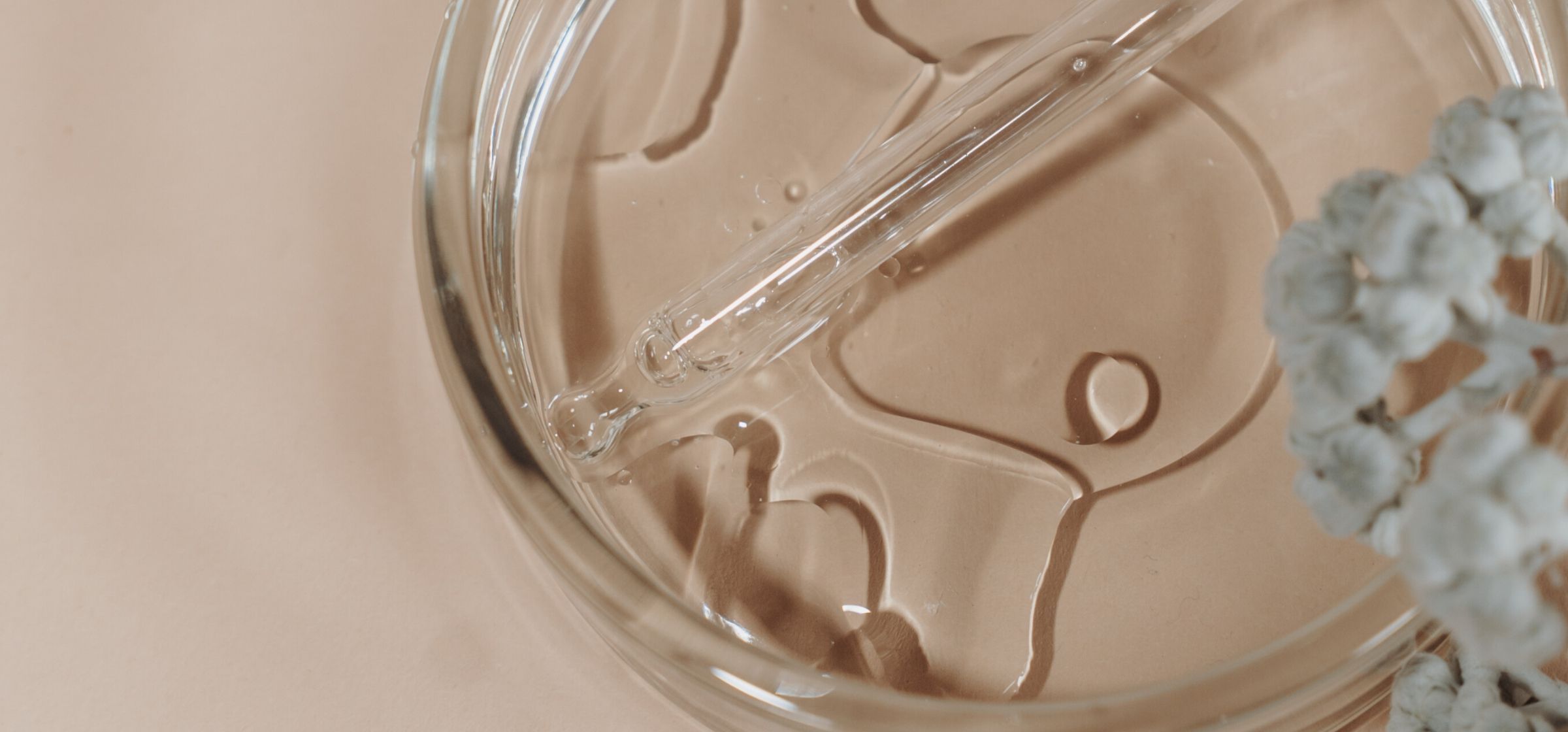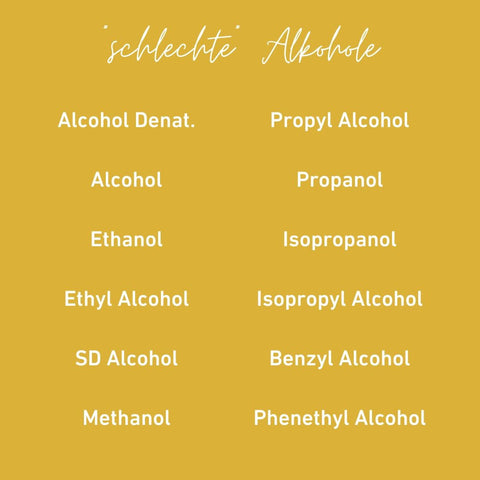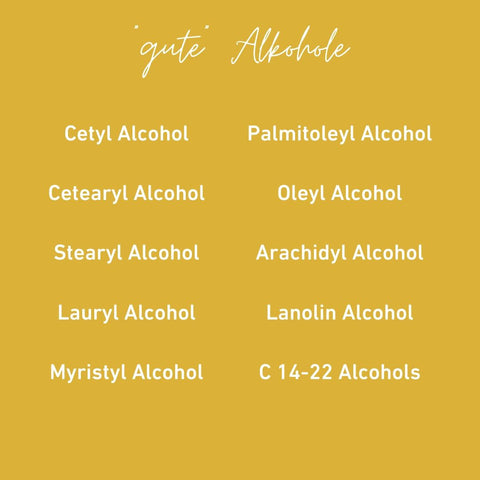
November 19, 2020
Alcohols in cosmetics – the dose is crucial!
by Leonie Poppe
Alcohol is a tricky thing. We know it from the drinks industry, of course, but the term is also used very frequently in cosmetics. And the claim “alcohol-free” is particularly popular as an advertising slogan.
In general, these ingredient topics are a difficult matter. After all, we are not here to badmouth anything, but to educate and draw attention to certain processes. With the articles on ingredient classes, I would like to shed some light on the matter and refresh your cosmetics know-how a little.
My aim is to show you the advantages and disadvantages, to explain to you why we avoid certain substances and not others. This gives you the opportunity to form your own opinion and ultimately decide for yourself what you want to pay attention to and what is important and right for you and your skin.
A few days ago I read a comment under one of our Instagram posts, the essence of which was that the dose makes the poison. And that's true. But it also showed me once again how important it is to emphasize our intention. To educate and not to demonize. Because concentration is - as with almost everything - the decisive factor.
This applies to alcohols, but also to other substances that we would generally describe as “good”.
Because even “too much” of pure, plant-based oils can be too much for your skin. It needs balanced care and, above all, ingredients tailored to its needs.
In this article I would like to go into more detail
- what alcohol is chemically
- what alcohol is used for in cosmetics
- which alcohols you should pay attention to above a certain concentration
- what “bad” alcohols do to the skin
- which alcohols are even good for the skin
- and which alcohols we use at junglück
What does alcohol actually mean?
The substances that we can group together in the alcohol group are similar in one central element: the hydroxy group! This means that a group consisting of an oxygen (O) and a hydrogen atom (H) is attached to a carbon chain, sometimes longer, sometimes shorter. This is a “-OH” group. This means that alcohols such as ethanol (the alcohol we drink) mix well with water, but also in organic substances.
What are alcohols used for in cosmetics?
This ability to mix well brings us to the first area of application for alcohols. They are great solvents! They also have a significant preservative effect. But not all alcohols are the same, that's for sure. Because here too, we can't tar all substances in this class with the same brush and say "all alcohols are bad"! Unfortunately, it's not that easy.
In general, the longer the carbon chains, the more insoluble in water, the more solid and even sweet the substances become. If we want to take the taste into account for a moment.
So, let's now look at which representatives we find in the group of alcohols and I'll give you a few INCIs that you should pay attention to.
Which alcohols should I watch out for?

These alcohols are the kind that can dry out your skin. I say can deliberately, because it depends on the concentration. And since we at junglück are very concerned about the tolerability of our products, we don't use these alcohols in our products.
These are mainly short-chain alcohols. Logically, the shorter the chain, the more liquid and water-soluble they are.
You often find them in
- Disinfectants
- Preservatives (from approx. 10% alcohol content)
- Solvents (carriers for odorous substances, e.g. from medicinal plants)
- Anti-inflammatory drugs
- Cleaning products
Ethanol is often used in disinfectants and preservatives. The concentrations can easily reach 50-70%. In the long run, this is far too much for our skin, because ethanol concentrations of 20% and above are problematic.
Because ethanol is such a good solvent, it doesn't stop at our skin either! The protective barrier is attacked, important building blocks are destroyed and the skin becomes permeable.
This breaking of cell connections is often used to improve the skin's ability to absorb fat-soluble active ingredients. This may work, but unfortunately the barrier does not close again like an opened door, but usually remains fragile. This is why uninvited guests such as bacteria and other germs can penetrate and worsen the skin's condition.
Alcohol for impure skin
This cycle also plays a role in cleaning products that contain alcohol. If you clean oily and blemished skin with a "bad" alcohol, you will usually have to deal with a worsening effect later on. The drying properties may initially reduce the oily film and the blemishes, but in the long term the damaged skin barrier can no longer protect itself and more spots and inflammation occur. The skin counteracts the drying out and produces even more sebum. That sounds rather unpleasant and unfortunately it is.
What else does alcohol do to the skin?
- Free radicals: Alcohol produces free radicals that weaken our healthy collagen structure and can lead to wrinkles.
- Skin diseases: Alcohol can further worsen skin diseases such as neurodermatitis or acne or lead to inflammatory reactions.
- Irritation: High concentrations of alcohol can cause drier and more irritated skin.
- Skin aging: Bye-bye alcohol, otherwise it’s hello premature skin aging.
Which alcohols are good for the skin?
But there are also “good” alcohols, the so-called fatty alcohols. These candidates even provide moisture! So be careful with the INCIs, even if it says “alcohol” on it, that doesn’t mean that it is a drying or irritating alcohol.

These fatty alcohols have longer carbon chains and are therefore firmer in consistency. They are amphiphilic, meaning they love both fat and water! This makes them excellent emulsifiers. They combine the water and fat phases in creams and are often obtained from vegetable oils and fats. In other words, from renewable raw materials.
Due to their properties, they also have completely different functions in cosmetics. In summary, they serve as
- Cream bases
- Emulsifiers in water-oil mixtures
- Moisturizer
- Non-ionic and anionic surfactants
- Texture enhancer
Sugar alcohols are also among the “good” alcohols. You probably know glycerin and sorbitol. These two moisturizers and moisturizers bind water, both in the product and in the skin, and also attract moisture from the environment!
In addition, glycerin is very well tolerated because, like hyaluronic acid, it is a substance produced naturally by the body.
However, it can have a drying effect at a concentration of 30% or more - which brings us back to the initial quotation: the dose makes the poison!
Because even too much of a good thing is too much!
It is therefore important that you make sure that you either avoid the "bad" and drying alcohols completely, or at least that they appear very far down in the list of ingredients. If a product is declared "alcohol-free", this simply means that it does not contain any drying (short-chain) alcohols. However, the recommended fatty or sugar alcohols may well be present! So, from a chemical point of view, the term is not entirely correct.
INCI list of alcohols
Some alcohols are easily identified by the ending “-ol”. There are almost endless numbers of them, so unfortunately I can’t list them all here. However, I hope that these two lists have given you a good starting point.
Which alcohols do we use at junglück?
We generally avoid drying alcohols because it is important to us that our products are particularly well tolerated. We are very happy to use fatty alcohols and especially the sugar alcohol glycerin for the reasons mentioned above!
It is found in almost all of our products and serves as a moisture retainer.
As you can see, it's all about knowing what you're doing and questioning the ingredients. And yes, the dose makes the poison!
With this in mind, I hope that I was able to show you a little bit about what is important in the world of alcohol. If you have any further questions about this or any other topic, please feel free to write to me at leonie@junglueck.de
Take time for yourself & be good to yourself!
Your Leonie





